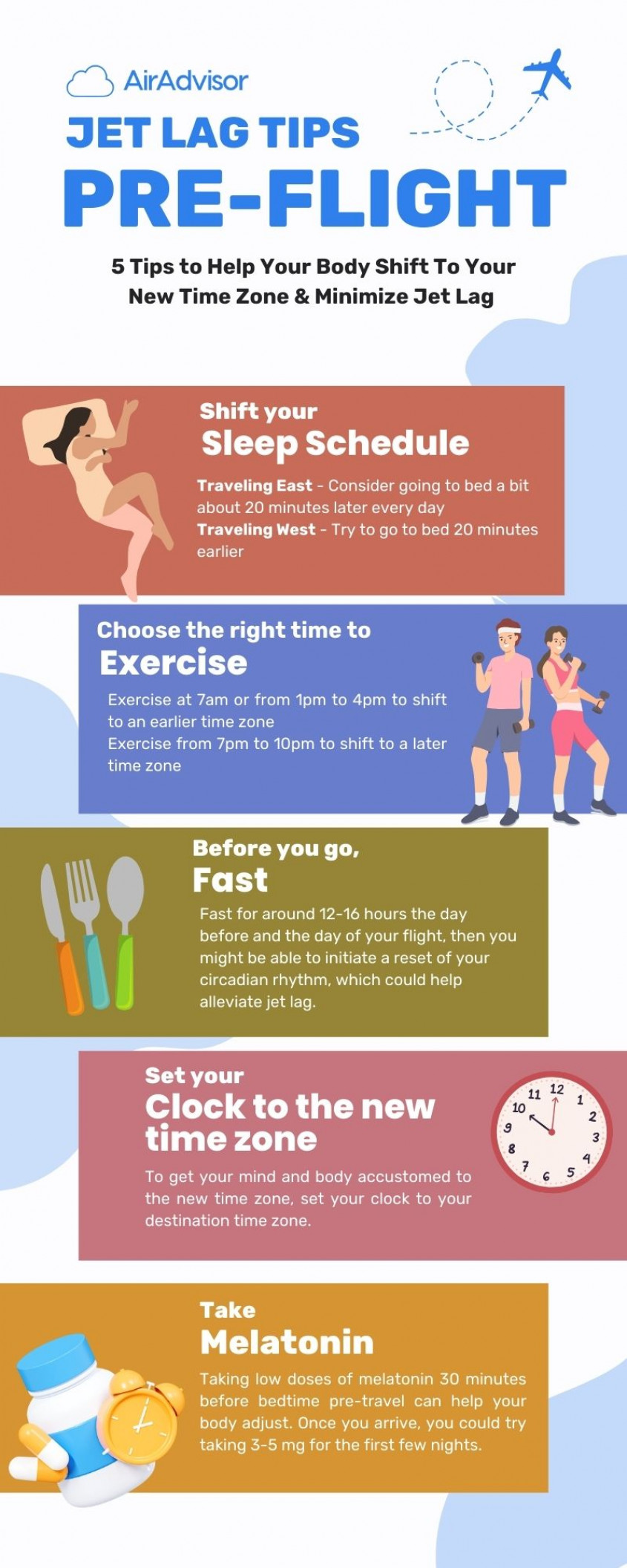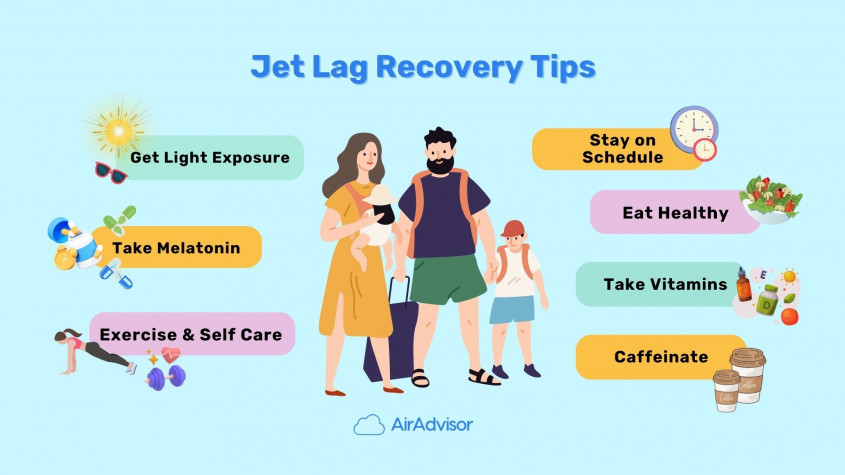
How to Get Rid of Jet Lag: a Step-by-Step Guide
Have you ever planned a full list of activities for your dream destination only to feel too exhausted to do them once you arrive? Well, what if you could ease the symptoms of jet lag or avoid it all together? Keep reading because we’re going to give you some info that may help you reduce the symptoms of jet lag or even elimate the negative effects all together.
What is jet lag
Jet lag is a collection of symptoms caused by a desynchronized circadian rhythm usually as a result of flying across several time zones. You can also get jet lag from red-eye flights. But generally, jet lag is episodic, meaning that it is trip related. It tends to be more severe than travel fatigue, and once you recover from the symptoms, you won’t be affected by them again unless you travel across time zones.
What happens in your body with jet lag
Your body follows a 24 hour cycle that is closely aligned to the sun and the seasons. More specifically, your body follows your internal clock or circadian rhythm that is influenced by light, dark as well as temperature and other factors.
The amount of light exposure you have in a day will cause your circadian rhythm to shift which will cause your blood pressure, temperature, hormones levels, and glucose to fluctuate as well. As the seasons change, the amount of sunlight changes with it. This causes your circadian rhythm to shift because your body will naturally produce melatonin when it gets darker. But unlike jet lag, seasonal shifts happen gradually enough to allow your body to adjust.
With jet lag, the shift happens so quickly as you fly across time zones, that your body doesn’t have time to adjust. When your body is thrown off balance in this way, your entire system is affected:
- Blood pressure
- Temperature
- Hormone levels
- Glucose levels
With all these internal regulators off balance, it’s no wonder you feel so worn out.
Jet lag symptoms
Jet Lag symptoms can vary widely from person to person but can include:
- Difficulty concentrating
- Sleep disruption
- Headaches
- Fatigue
- Drowsiness
- Dizziness
- Nausea
- Constipation
- Digestive issues
- Feelings low mood or irritability
Symptoms usually start to ease the “rate of 1 day per time zone”1. So, if you’re traveling across 3 time zones, you’ll need around 3 days to recover.
Risk Factors for Jet Lag
Some people might suffer the effects of jet lag more than others, but some risk factors2 can increase your chances of suffering from it.
What contributes to jet lag
- How many time zones you’ve crossed: The farther you travel, the greater the jet lag symptoms
- Your age: The older you are, the more likely you will feel jet lagged
- Flying frequently: Instead of lessening the effects of jet lag, frequent long-haul trips can make it worse.
- Traveling east: Interestingly, jet lag seems to hit harder if you’re flying eastward because you’re losing time instead of gaining it.
- Cabin pressure: The Mayo Clinic also says that the cabin pressure and altitude you experience when you fly can play into the severity of jet lag. The extra dry air in the cabin can also exacerbate dehydration which adds to jet lag symptoms.
The difference between jet lag and travel fatigue
While jet lag and travel fatigue might seem to be the same, they're actually separate and district conditions. So, before we get into the ways of minimizing the effects, let's first define our terms.
What is travel fatigue
Travel fatigue3 is caused by the stresses of travel and can be felt after one very long trip or because of the accumulation of many trips. Cramped seats, altitude, changes in cabin pressure, long periods of sitting, and jet lag can all contribute to travel fatigue. The symptoms are generally less severe than jet lag, but can last longer.
Travel fatigue symptoms
- Loss of motivation
- Recurrent illness
- Changes in mood
- Long-lasting fatigue
Chronobiology and jet lag
Most techniques that help minimize the effects of jet lag utilize chronobiology. Chronobiology is the study of your body’s internal rhythms and their effect on your physiological and behavioral processes. More specifically, it focuses on how these body rhythms can be regulated and synchronized when exposed to changes in light, temperature, and various internal components.

Jet lag tips pre-flight
1. Start shifting your sleep schedule
A week before your departure date, start adjusting your daily sleep schedule each day to help your sleep-rest cycle match the time zone of your destination.
- Traveling East - Consider going to bed a bit about 20 minutes later every day
- Traveling West - Try to go to bed 20 minutes earlier
If drastically readjusting your sleep schedule to match the new time zone isn’t an option, then give yourself a deep, uninterrupted night sleep at least 3 days before you travel. Also, make sure you are well rested before getting to the airport because you’ll need the extra energy and resources to deal with jet lag.
2. Exercise
Exercise will help your body prepare for the time zone shifts, but interestingly when you work out can make a big difference as well!
A 20194 study found that, regardless of your sex or age, you can:
- Shift your circadian rhythm earlier when you exercise at 7am or from 1pm to 4pm.
- Shift your circadian rhythm later by exercising from 7pm to 10pm.
Stay as healthy as possible prior to your trip. Also, try to minimize stress because naturally, lower stress means better sleep. You can also try exercising more intensely in the days leading up to your departure. Why? Well, because vigorous physical activity will help your body release dopamine and endorphins, allowing you to feel more calm and relaxed.
3. Fast before you go
Seriously! Research5 from Harvard-affiliated Beth Israel Deaconess Medical Center found that your circadian rhythm can be shifted in the absence of food. This happens because your body will pause its circadian rhythms as a way to save energy.
So, if you fast for around 12-16 hours the day before and the day of your flight, then you might be able to initiate a reset of your circadian rhythm, which could help alleviate jet lag.
*Remember, this isn’t medical advice. Listen to your body, and only fast if you are healthy and/or have advice from your doctor.
4. Set your clock to your new time zone:
To get your mind and body accustomed to the new time zone, set your clock to your destination time zone. This might be more of a psychological hack but if it works for athletes1 when they travel and have to perform well when they arrive, it might just be worth a try.
In order to create an action plan that successfully reduces jet lag fatigue and discomfort, you can use apps like Timeshifter. This gives you a jet lag calculator to help you determine what you need to do when you arrive by sending you reminders based on the details of your journey.
5. Take melatonin
Melatonin is a naturally occurring hormone your body produces as a response to darkness6. And while taking melatonin for jet lag might seem like common knowledge these days, how much you take and when you take it is still something of a mystery.
Research7 on the treatment and prevention of jet lag, along with results from clinical practice, found that taking low doses of melatonin 30 minutes before bedtime before you travel can help your body adjust. Once you arrive, you could try taking 3-5 mg for the first few nights.
*This is not medical advice. Always consult your doctor before taking any supplement.
How to Beat Jet Lag During Your Flight

1. Stay hydrated
Yes, as always, drink plenty of water. Why? Because spending multiple hours in a pressurized, air-conditioned space can have a very dehydrating effect on your body, which will make jet lag symptoms more intense. Ask the flight attendant for extra water, or better yet, bring your own water or electrolyte drink, and pass on the caffeine and alcohol. Both can cause even more dehydration and make jet lag symptoms worse.
2. Move around
The key here is timing. Remember, the trick for avoiding jet lag is to adjust your circadian rhythm. So, while movement and stretching can help you stay limber and improve blood flow, it will also make you more alert.
Because of this, try to stretch, do neck and shoulder rolls, and stroll along the aisle only during waking hours of your destination’s time zone. Of course you can stretch any time during your flight especially to avoid blood clots, but more vigorous movement should be used to help your body feel awake.
3. Sleep
In general, try to avoid snoozing on the plane at random times. Instead, check your pre-set watch, and try to fall asleep when it’s appropriate for the new time zone.
Light exposure plays a huge part in affecting our circadian rhythms8, so be sure to avoid artificial light before you go to sleep. Both your own devices and on-board entertainment screens use blue light that can affect your body rhythms.
Similarly, darkness exposure can help you train your biological clock to your destination’s time zone. The trick is to get as much total darkness as possible. The best way to do this is to use a sleep mask or very dark sunglasses, or both.

4. Stay comfortable
If you’re comfortable, you’ll also be more relaxed. When you’re relaxed your body functions better and you’re more likely to get better sleep. So to this end, be sure to bring everything you need to enjoy as much comfort as possible.
- Wear ear plugs
- Stay warm
- Bring the right pillow
- Choose comforting music or music
5. Choose light meals
We mentioned before that intermittent fasting can help you minimize jet lag. But understandably, that option won’t work for everyone. If this is you, consider eating as little as possible on the plane, or if you need to eat something more substantial, consider bringing your own food.
Nuts (low sodium), dried fruit, protein bars, and other light, healthy nibbles tend to be a better choice than heavier greasy and starchy meals. You can also try to pre-book healthy meal options, just avoid caffeine and alcohol as these can add to the dehydrating effects of flying.
Also, if you do eat, try to do so during the typical meal times of your destination.

How to recover from jet lag when you arrive
1. Light Exposure
If you arrive at your destination in the morning, and it’s still nighttime for you at home, try not to succumb to the urge to sleep. Instead go outside, get some fresh air and some natural light from the sun. Exposing yourself to natural sunlight will help your internal clock adjust to the new timezone.
If it’s cloudy or raining, sitting in front of a light box can also ease jet lag8 symptoms. Blue light in particular can also help you feel more awake, which is also why you should avoid blue light exposure at night or when you’re trying to wind down.
At the same time, don’t plan anything too intense and give yourself some space to relax while staying awake. Go to sleep at a reasonable time, and don’t forget to let your eyes rest by dimming the lights an hour before you go to bed.
2. Melatonin
As we said above, melatonin can help you adjust to your new time zone. If you’re having difficulty falling asleep, then try taking 3mg for a few days.
3. Exercise and self-care
Even though you might feel very tired during the first couple of days, try to do some exercise to help your body produce all the necessary hormones it needs to recover from jet lag faster. Even a simple walk will do!
4. Stay on track
Do everything according to the new timetable: have your meals at an appropriate time and go to bed when it’s time to do so. Also, try to stick to a routine during the first 3 days - eating, getting up and going to bed at the same time every day.
5. Eat healthy and take some vitamins
Make sure your diet includes plenty of fruit and vegetables as well as healthy proteins, stay hydrated and avoid junk food even if it’s just a snack.
Also, taking some vitamins may help you feel better overall, but the following supplements may contribute to your jet lag recovery.
- B Complex - May support insomnia and fatigue9
- Vitamin D - Can help with sleep regulation10
- Vitamin E - May help support chronic sleep deprivation11
- Vitamin C - May help enhance sleep duration, immune function, inflammation12
6. Drink caffeinated beverages
If you want to quickly sync your body rhythms to your new time zone, then staying awake during the daytime is vital if you want to also sleep well at night. How do you stay awake?
Well, one study13 found that taking roughly 300 mg of caffeine can help you stay alert especially if you’ve traveled east. Just be sure to limit your caffeine intake to the early part of the day.
Jet lag tips for short business trips
If you’re a business professional, you might have to take quick trips to different countries. Short trips like these can make it much more difficult to manage jet lag.
If you travel frequently across time zones, some of the advice above may not be applicable. Instead, you might want to adjust your work schedule and business meetings to better match your usual circadian rhythm.
Try to notice which time of the day is the most productive for you, and see if you can schedule the most important events for that time. This will allow you to spend those days as you usually do without changing your routine. Plus, you won’t have to re-adjust again when you come back.
Understandably, some appointments can’t be scheduled according to your timetable, so try to plan some resting time around those fixed meetings. Also, remember to take care of yourself and give extra attention to your health before and during the trip.
Jet lag in children

Your baby benefits from the same jet lag strategies as adults, but do not give baby any supplements without your doctor’s recommendation.
Your best bet is to gradually adjust baby’s daily routine before you travel. So, in the same way that you would slowly make changes, you can also slowly shift baby’s bedtime, meal schedule and naps.
Speaking of naps14, did you know that circadian rhythms do not control napping? The folks over at Baby Sleep Science suggest that because of this, you can control when your child naps and use this to gradually shift their sleep schedule.
When you arrive at your destination, give your baby at least 3 days to adjust. Take regular walks or do any other type of exercise, and take in as much morning sunlight as possible.
After 3 days of adjustment you can start following the local time zone when scheduling your day. If your baby is 6 months or younger, this process might even be easier for them since they take a lot of naps, and getting that much sleep helps them get used to the new environment sooner.
Conclusion
While jet lag might seem avoidable, you can minimize the experience of it. The most important thing to do is to plan ahead and make sure you have everything you need to get used to the new zone more quickly.
Take extra care of your health during trips across multiple time zones, and your body’s own adaptive mechanisms will naturally catch up. Lastly, remember that if your long-haul flight gets canceled or delayed, don’t try to deal with it on your own.
Reach out to AirAdvisor, and our team of experienced legal professionals will help you get the compensation you deserve. It’s totally risk free! Check to see if your flight is eligible.Check eligibility
References:
1 Samuels, Charles H. MD*,†. Jet Lag and Travel Fatigue: A Comprehensive Management Plan for Sport Medicine Physicians and High-Performance Support Teams. Clinical Journal of Sport Medicine 22(3):p 268-273, May 2012. | DOI: 10.1097/JSM.0b013e31824d2eeb
2 Jet lag disorder - Symptoms and causes - Mayo Clinic. (2022, November 19). Mayo Clinic. https://www.mayoclinic.org/diseases-conditions/jet-lag/symptoms-causes/syc-20374027
3 Janse van Rensburg DC, Jansen van Rensburg A, Fowler PM, Bender AM, Stevens D, Sullivan KO, Fullagar HHK, Alonso JM, Biggins M, Claassen-Smithers A, Collins R, Dohi M, Driller MW, Dunican IC, Gupta L, Halson SL, Lastella M, Miles KH, Nedelec M, Page T, Roach G, Sargent C, Singh M, Vincent GE, Vitale JA, Botha T. Managing Travel Fatigue and Jet Lag in Athletes: A Review and Consensus Statement. Sports Med. 2021 Oct;51(10):2029-2050. doi: 10.1007/s40279-021-01502-0. Epub 2021 Jul 14. PMID: 34263388; PMCID: PMC8279034.
4 Youngstedt, S.D., Elliott, J.A. and Kripke, D.F. (2019), Human circadian phase–response curves for exercise. J Physiol, 597: 2253-2268. https://doi.org/10.1113/JP276943
5 Resetting your circadian clock to minimize jet lag. Harvard Health. (2016, September 8). https://www.health.harvard.edu/blog/resetting-your-circadian-clock-to-minimize-jet-lag-2016090810279
6 U.S. Department of Health and Human Services. (n.d.). Melatonin: What you need to know. National Center for Complementary and Integrative Health. https://www.nccih.nih.gov/health/melatonin-what-you-need-to-know
7 Herxheimer A, Petrie KJ. Melatonin for the prevention and treatment of jet lag. Cochrane Database Syst Rev. 2002;2:CD001520.
8 Eastman CI, Burgess HJ. How To Travel the World Without Jet lag. Sleep Med Clin. 2009 Jun 1;4(2):241-255. doi: 10.1016/j.jsmc.2009.02.006. PMID: 20204161; PMCID: PMC2829880.
9 Tardy AL, Pouteau E, Marquez D, Yilmaz C, Scholey A. Vitamins and Minerals for Energy, Fatigue and Cognition: A Narrative Review of the Biochemical and Clinical Evidence. Nutrients. 2020 Jan 16;12(1):228. doi: 10.3390/nu12010228. PMID: 31963141; PMCID: PMC7019700.
10 Romano F, Muscogiuri G, Di Benedetto E, Zhukovskaya VV, Barrea L, Savastano S, Colao A, Di Somma C. Vitamin D and Sleep Regulation: Is there a Role for Vitamin D? Curr Pharm Des. 2020;26(21):2492-2496. doi: 10.2174/1381612826666200310145935. PMID: 32156230.
11 Alzoubi KH, Khabour OF, Rashid BA, Damaj IM, Salah HA. The neuroprotective effect of vitamin E on chronic sleep deprivation-induced memory impairment: the role of oxidative stress. Behav Brain Res. 2012 Jan 1;226(1):205-10. doi: 10.1016/j.bbr.2011.09.017. Epub 2011 Sep 16. PMID: 21944940.
12 Otocka-Kmiecik A, Król A. The Role of Vitamin C in Two Distinct Physiological States: Physical Activity and Sleep. Nutrients. 2020 Dec 21;12(12):3908. doi: 10.3390/nu12123908. PMID: 33371359; PMCID: PMC7767325.
13 Ambesh P, Shetty V, Ambesh S, Gupta SS, Kamholz S, Wolf L. Jet lag: Heuristics and therapeutics. J Family Med Prim Care. 2018 May-Jun;7(3):507-510. doi: 10.4103/jfmpc.jfmpc_220_17. PMID: 30112298; PMCID: PMC6069654.
14 MPH, E. F.-E. P. (2021, December 15). Jet lag survival guide: Traveling 1-3 time zones eastward baby sleep science. baby sleep science. https://www.babysleepscience.com/single-post/2014/08/15/jet-lag-survival-guide-traveling-1-3-time-zones-eastward
No feedback
Leave your feedback
We don’t spam.

